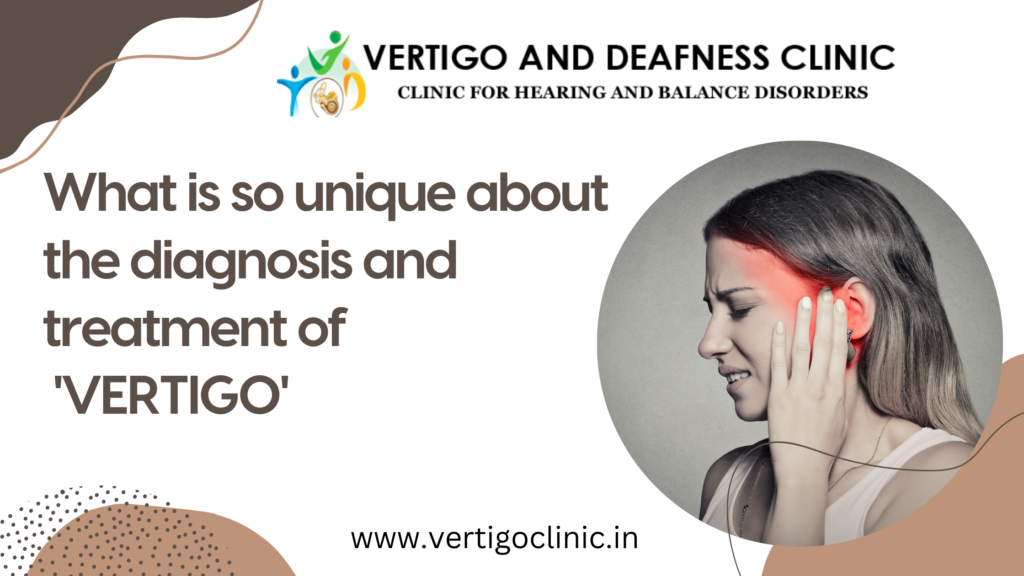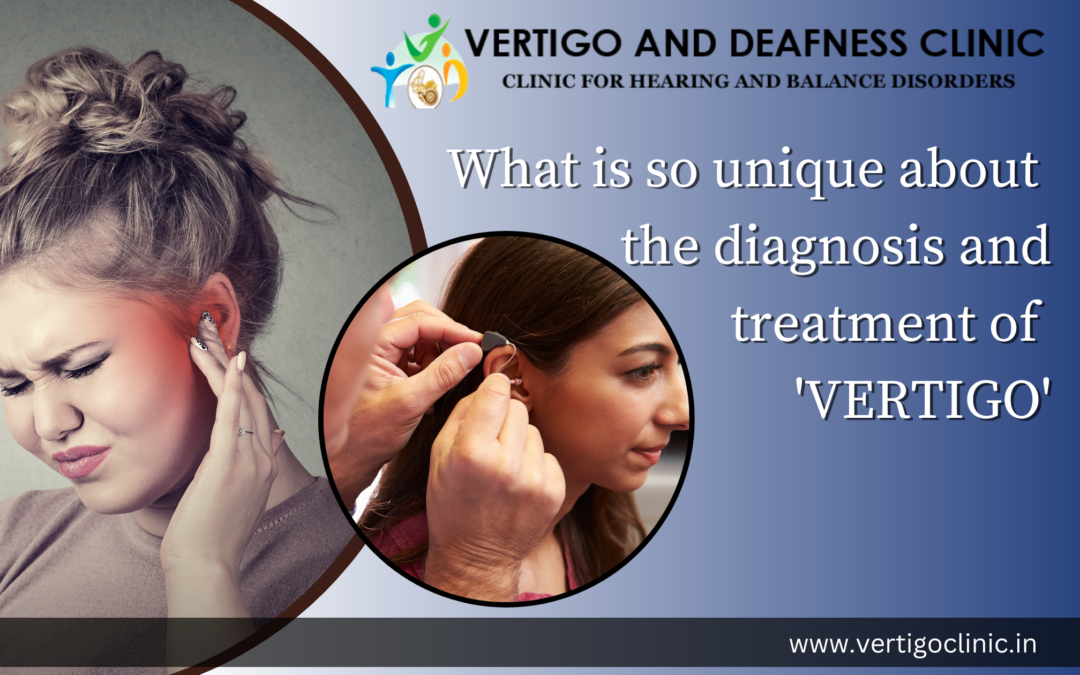Introduction
Living with deafness and vertigo can be challenging. Both deafness and balance disorders be it vertigo, or unsteadiness or recurrent sinking sensations or dizziness and hearing / auditory system disorders like deafness and tinnitus have a strongly detrimental impact on overall wellbeing. A expert correct diagnosis, and on the basis of it, a precise and rational treatment is essential to manage these conditions. Healthcare professionals with specialization in neurotology have the expertise to identify the root cause accurately and provide disease-specific treatment strategies. A multidisciplinary approach to treatment that incorporates pharmacotherapy, audiological therapy, rehabilitation programs and other modalities of therapy like psychotherapy including cognitive behavioral therapy as and when required maximizes results. With the aid of specialist treatments, people can get back normal balance function and also overcome the hearing disability all of which enhances their overall health and quality of life.
A. Brief explanation of vertigo and deafness as medical conditions
Deafness and vertigo are medical symptoms of some underlying disease conditions. Both deafness and balance system disorders like vertigo have significant impact on people affecting activities of daily living. Vertigo involves sensations of dizziness, balance issues and often vestibular or cochlear symptoms. Deafness refers to hearing loss that is either complete or partial. Deafness due to cochlear diseases may be caused by genetic mutations, environmental factors like loud noise exposure, auto-immune disorders, trauma, infection or age-related degenerative changes. Both balance and hearing disorders necessitate correct diagnosis followed by correct and disease-specific treatment to alleviate symptoms, reverse or at least stop the disease process as well as restoring/ improving balance and hearing capabilities. This is only possible by specialist diagnostic and therapeutic procedures. Without this a complete or even partial recovery is not possible.
B. Importance of expert diagnosis and treatment for optimal care
Diagnosing and treating conditions like vertigo or deafness accurately, is critical to providing optimal care for those hapless patients experiencing them. It is unethical and irrational to try and suppress the symptom of vertigo or deafness by the symptom-relieving anti-vertigo drugs which can at best partly camouflage the symptom of vertigo, dizziness, unsteadiness, deafness and related disorders like tinnitus. However, this is what is rampantly practiced. This happens as there are very few well equipped neurotology clinics and very few doctors who have the requisite insight and knowledge to manage balance system disorders. Only experienced healthcare providers trained and experienced in neurotology (which is the medical discipline for the management of audio-vestibular disorders) can comprehend the complexities associated with deafness and vertigo. It is this neurotological insight that enables neurotologists to provide unique treatment strategies that includes medication customized for combating the underlying disorder, some physical therapies, quite often psychotherapy in the form of reassurance and counselling and very rarely surgical procedures to address patient’s hearing and / or balance problems efficiently and effectively.
Accurate Diagnosis Healthcare:
Accurate Diagnosis Healthcare providers with advanced knowledge can conduct thorough assessments and progressive tests to accurately pinpoint the source of deafness or vertigo symptoms to develop tailored treatment strategies with more effective results.
Treating a balance disorder patient i.e., a patient suffering from vestibular and /or auditory symptoms entails not only treating the underlying disease causing the symptom of head-spinning, imbalance, dizziness, fear of fall or the auditory symptoms. This is only a part of the treatment. Neurotological treatment in addition to treating the causative disease also entails (1) restoring the patient’s balance which is possible only by perfectly carried out vestibular physiotherapy, (2) improving the patient’s level of confidence and sense of balance security as a feeling of mental insecurity and fear of fall is the most distressing experience that balance disorder patients undergo and this is possible by reassurance, proper counselling and if required psychotherapy. The objective of treatment is to improve the patient’s quality of life not just stopping the symptom of head spinning and vomiting. Without this holistic therapeutic approach, treatment of neurotological disorders remains incomplete.
Advanced Technologies: Clinics equipped with cutting-edge technologies can offer precise evaluations and employ cutting-edge treatment methods that lead to greater patient outcomes.
Advance Technologies
Neurotology clinics are different from other medical clinics. Such clinics need to cater to a lot of issues as neurotology patients have unique problems affecting their physical and mental health. Understanding the disease is as important for the patient as it is for the doctor. The neurotology patient needs to be educated about the disease and taught ways and means of coping with the disease. The same neurotological disease can cause different morbidities in different individuals. This is unique in patients suffering from vertigo, dizziness, unsteadiness as well as in patients of deafness and tinnitus. Hence evaluating the patient’s morbidity induced by the disease is a big part of the diagnostic work-up. Treatment will have to be in accordance to it.
Neurotological clinics need to offer assistance in empowering the patient to deal with their problems of vertigo and deafness-related issues. This is possible by offering advice, information, mental support, and access to resources on balance disorders and hearing disorders. This empowers the patient to pursue their personal and professional goals more effectively, enables the patient to lead an independent life and join mainstream. The neurotologist’s job does not stop at treating the disease with some medications only. It is much beyond that.
Understanding Vertigo:
Vertigo is not the name of any disease. It is just a symptom / manifestation of some underlying medical disorder. Though not correct in the literal way, the term ‘vertigo’ is often used in a very broad sense to convey a lot of related disorders like dizziness, unsteadiness , sinking sensation, blackouts etc. But these are all different symptoms. Any doctor using the term ’vertigo’ as the patient’s diagnosis is actually doing a disservice to the patient. The term ‘Vertigo’ is just the English translation of ‘chakkar’. The patient is not paying the doctor to have his symptom translated to English. The doctor’s job is to ascertain the cause of the vertigo and then treat the cause.

Common Causes:
Common causes of vertigo include BPPV, Vestibular migraine, Meniere’s disorder, Vestibular neuritis and labyrinthitis. Each disease necessitates a completely different therapeutic approach. A very large subset of patients presenting with balance disorders actually have psychogenic disorders. These disorders may be either a frank psychological / psychiatric disease or a functional disease. The latter is a behavioral disorder with manifestations in the domain of neurotology. Many balance disorder patients have neuro-degenerative disorders like Parkinson’s disease, cerebellar disorders, multiple sclerosis, hydrocephalus and a host of other purely neurological diseases some of which are pretty sinister. Hematological disorders, cardiac disorders and metabolic diseases can also present with neurotological manifestations of vertigo, unsteadiness, dizziness, sinking feeling and / or hearing related disorders.
Accurate recognition of the underlying disease is key for effective treatment. A thorough physical examination, a thorough history-taking process, some specialized tests, such as vestibular function tests, imaging studies, psychological evaluations, and occasionally special neurological tests, are all part of the diagnostic process. History taking is the most important diagnostic tool in neurotology and to do justice to a patient of vertigo the doctor needs to have sufficient time and offer a patient hearing to the patient. The medical set-up for the treatment of balance diorders must also have some sophisticated tools for evaluating the structural and functional integrity of the balance system.
Awareness about the diagnosis and management of balance related disorders is abysmally poor not only among patients but also among most doctors. By increasing awareness about vertigo and the related symptoms like dizziness, unsteadiness, deafness and tinnitus, patients can seek appropriate treatments more easily.
Is this the name of any clinic?? If not so then reframe the sentence and write it like this .
Only healthcare providers with special interest and training in NEUROTOLOGY can conduct a very very thorough history-taking, carry out an array of clinical tests some neurological tests and some neurotological tests and also perform some very specialised investigations to accurately pinpoint the source of the symptoms of vertigo, unsteadiness, dizziness, deafness and tinnitus. Not only that the degree of physical and mental handicap also needs to be assessed.

